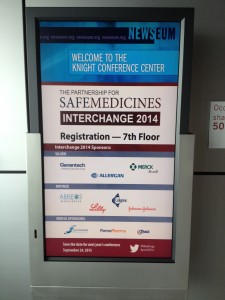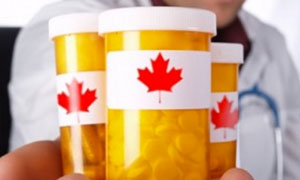by Gabriel Levitt, President, PharmacyChecker.com and Prescription Justice | Oct 9, 2014 | FDA, Online Pharmacies, Pharmaceutical Industry

Drug Companies Front and Center at PSM Interchange Conference
Two weeks ago I brought you some highlights of the PhRMA-led Partnership for Safe Medicines (PSM) Interchange propaganda show, which was held on September 18th. Look over to the left. See that picture. Those logos of big pharmaceutical companies make it abundantly clear who is pushing the distorted message of PSM about personal drug importation and online pharmacies.
I’m not joking about the word “propaganda” applied to the PSM event. The online Merriam Webster dictionary provides the following definition for that word: “ideas or statements that are often false or exaggerated and that are spread in order to help a cause, a political leader, a government, etc.” In this case, as I see it, the “cause” of PSM is the commercial agenda of the pharmaceutical and U.S. pharmacy industries cynically couched behind terms of patient safety. A central message of PSM is that Americans are risking their lives buying medication online from other countries and that there is no way to do so safely. Those are false and exaggerated messages that are potentially leading lawmakers and regulators to overreact and scare Americans from a potential lifeline of affordable prescription drugs. Evidence shows that this has been PhRMA’s communications strategy for more than a decade. (more…)
Tagged with: Counterfeit Drugs, daniel burke, FDA, Interchnage, laganga, Mississippi AG hood, OCI, Partnership for Safe Medicines, phrma, PSM
by Gabriel Levitt, President, PharmacyChecker.com and Prescription Justice | Aug 15, 2014 | Drug Prices, Drug Safety, FDA, Generic drugs, New Drugs
Most people think newer is better, but according to a study published in Health Affairs that might not be the case for prescription drugs. In short, the new study shows that drugs approved by the U.S. Food and Drug Administration after enactment of the Prescription Drug User Fee Act of 1992 (PDUFA), a bill that led to more expeditious drug approvals funded by drug companies, were more likely to have safety problems than ones approved before PDUFA. These findings are not only relevant to drug safety, but also to drug savings. Older drugs are often sold as generics and, thus, will have much lower co-payments than new drugs. For those paying out-of-pocket, the cost of a generic is often 80% less than the brand.
The study analyzed 748 drug approvals between 1975 and 2009. The approvals were of new molecular entities not for generic versions of existing brand-name drugs. Before PDUFA the chances that safety issues would arise involving approved new drugs was 21.2%; after PDUFA it increased to 26.7%.
According to the lead author, “The FDA needs to make sure drugs are safe before they’re approved, not rush to judgment in order to meet artificial deadlines.” Not surprisingly, FDA and the Pharmaceutical Researchers and Manufacturers of America, take issue with the study. Their main points are that PDUFA helped speed up important drug approvals and get medications to patients faster and it improved the predictability of FDA’s system of drug approvals.
Regulations for marketing and manufacturing new drugs can save people and they can kill people. If the regulations are too rigid then patients won’t get needed medications fast enough. Or regulations can increase manufacturing costs resulting in unaffordable drug prices. If regulations are too weak then drugs will be less safe and effective. While in my opinion the study clearly has merit, PDUFA is helpful. Before its passage, drug approvals were lagging far behind other advanced economies in Europe.
Furthermore, the study does not show “causality,” meaning it does not prove that faster drug approvals after PDUFA led to less safer drugs. Nonetheless, it’s understandable that a drug with a long history of safe and effective use, accompanied by few side effects, is more trustworthy than a newly approved drug since the long term effects of the latter are unknown.
But what does this all mean for consumers and drug savings? (more…)
Tagged with: Atorvastatin, Brintellix, Crestor, Prozac, SSRI, Statin
by PharmacyChecker.com | Apr 8, 2014 | Advocacy, Drug Importation, FDA
Americans may be concerned by recent reports in the media about the safety of medications made in India (e.g., the New York Times article “Medicines in India Set off Safety Worries”). Problems with Indian drugs should be neither overlooked nor overstated. In this post we try to put this into perspective for American consumers who purchase Indian medication at their local pharmacies, whether they are aware it’s from India or not, or directly from an Indian pharmacy by ordering online.
Over the past decade, prescription medicine made in India has been sold in large quantities in U.S. pharmacies. Today, according to the FDA, Indian medications make up about 33% of all prescriptions filled here. In fact, Walmart’s ability to offer a $4 generic drug program was initially due to importing and selling medicines from the Indian drug companies Ranbaxy and Cipla. However, last year Ranbaxy was found to be making false claims to the U.S. Food and Drug Administration and exporting medications to the United States that did not comply with FDA’s regulations. The FDA fined Ranbaxy $500 million and banned importation of its products made in India.
It’s important to note that well-known brand name pharmaceutical companies, based in the U.S. and other rich countries, also have serious manufacturing problems. GlaxoSmithKline was fined $750 million for knowingly selling adulterated prescription medication that ended up in local U.S. pharmacies. In 2010, Eli Lilly was sent a warning letter from the FDA for violations of good manufacturing practices. Those are two examples of many.
The FDA’s discovery of more problems at Indian manufacturing plants is not necessarily due to new health risks associated with Indian drugs. In the past, the FDA could not afford to conduct regular inspections of many, if not most, foreign drug manufacturing facilities. Greater funding under a new law has enabled more FDA scrutiny of Indian drug companies, which has led to increasing regulatory enforcement by FDA. A major problem is that the Indian counterpart to the FDA, the Central Drug Standard Control Organization, needs to do a better job regulating drug safety. In fact, FDA Commissioner Margaret Hamburg recently travelled to India to engage her counterparts in a plan to improve regulatory oversight of drug manufacturers. We applaud her initiatives with India.
Another issue in India is that some Indian manufacturers make less quality, lower cost medicines for sale to poorer countries and to poorer segments of the population within India. This two-tier system is sad but true.
So where does that leave you as a consumer?
Notwithstanding the greater scrutiny by FDA in India, Indian medications sold to Americans are generally of high quality, whether purchased at a U.S. pharmacy or from a PharmacyChecker-approved online pharmacy dispensing from India. To be approved within the PharmacyChecker.com program, an Indian pharmacy must only dispense medications manufactured in plants which are 1) approved by FDA or by other strong regulatory authorities such as those in Canada and the UK; 2) operated by the largest and best Indian drug manufacturers who are known to most consistently sell high quality medication; or 3) approved by Indian regulators and inspected by qualified American personnel to meet FDA standards of Good Manufacturing Practices. In addition, every Indian pharmacy approved by PharmacyChecker.com has been inspected by an American pharmacist with special expertise in international mail-order pharmacy safety, and its pharmacy license has been verified with regulatory authorities in India.
As we’ve written before, international online pharmacies are not just “Canadian pharmacies.” Most of the reputable ones originated in Canada but are now partnered with pharmacies in several countries, including India. Other verified and safe international pharmacies are located in Australia, New Zealand, and the United Kingdom. There are even pharmacies created specifically for international mail-order pharmacy services on island nations. The ones approved in the PharmacyChecker.com Verification Program meet very high standards.
Where you order from should be based on the best information available and we strive to provide it. India has become the top supplier of generic medications worldwide but not all their medications are created equal.
Tagged with: Cipla, Eli Lilly, FDA, GlaxoSmithKline, India, Indian Pharmaceuticals, Ranbaxy
by PharmacyChecker.com | Apr 4, 2014 | Advocacy, FDA, Healthcare Reform
Section 708 of the Food and Drug Safety and Innovation Act of 2012 allows U.S. Customs and Border Patrol (CBP) to destroy your imported prescription orders. Even if the drug is the real deal, safe and effective, it can be destroyed. But wait! The law can’t take effect until the Secretary of Health and Human Services, Kathleen Sebelius, publishes regulations that provide Americans the opportunity to contest when their medications are seized by CBP. She is drafting those regulations right now, which will be followed by a period for public comment. Let her know that she is now responsible for protecting your access to affordable, imported medication. She should understand. As governor of Kansas, Kathleen Sebelius adopted a personal drug importation program by providing information online that helped residents find lower cost medications from licensed foreign pharmacies.
Sign the Petition!
Tagged with: Food and Drug Safety and Innovation Act of 2012, Kathleen Sebelius, Section 708
by PharmacyChecker.com | Mar 25, 2014 | FDA, Healthcare Reform, Online Pharmacies
Today, the New York Times published an Op-Ed by PharmacyChecker.com Vice President Gabriel Levitt entitled “Scare Tactics over Foreign Drugs” which explains that actions by our government and the pharmaceutical industry to frighten people risks leaving them without the medicines they need. I encourage you to read the article.
To learn more about the issues at play check out The International Online Pharmacy Report for 2013: The Good, the Bad, and The Ugly.
Tagged with: Big Pharma, FDA, Gabriel Levitt, The New York Times
by Gabriel Levitt, Vice President, PharmacyChecker.com and Sam Werbalowsky, Pharmacychecker.com | Feb 13, 2014 | Drug Importation, FDA, Online Pharmacies
(Click here to skip the explanations and view the steps to finding a Canadian online pharmacy)
 If you’ve seen one of the latest FDA press releases regarding Canadian pharmacies, you might be a little confused on how to find one. The FDA seems to acknowledge that there are legitimate – and therefore safe – Canadian pharmacies accessible online. Here’s what they say (with one word italicized by us):
If you’ve seen one of the latest FDA press releases regarding Canadian pharmacies, you might be a little confused on how to find one. The FDA seems to acknowledge that there are legitimate – and therefore safe – Canadian pharmacies accessible online. Here’s what they say (with one word italicized by us):
“Don’t order medicines from web sites that claim to be Canadian pharmacies. Most are not legitimate pharmacies, and the drugs they supply are illegal and potentially dangerous.
Claiming to be a Canadian pharmacy is one of the hallmarks of Internet sites that sell illegal prescription drugs which, in many cases, are not made in Canada at all, but in a number of other countries. (Even if an online Canadian pharmacy is legitimate, in general, U.S. citizens cannot legally import prescription drugs from other countries. But that’s a separate issue. We’re talking here about fraud).”
The FDA’s focus on protecting you from online pharmacy fraud is commendable because that’s where the real health and safety threats reside. Since they don’t tell you how to find a legitimate, real Canadian pharmacy, we’re providing you with facts and guidance to help you make the right decisions for your health and prescription savings. Let’s remember, brand name medications sold in Canada and other non-U.S. pharmacies are often astronomically cheaper than ones here at home. (more…)
Tagged with: Canadian pharmacies, FDA, NABP, phrma




